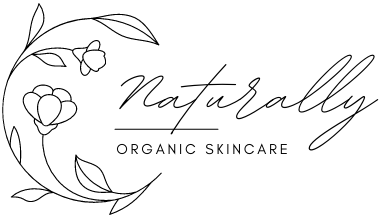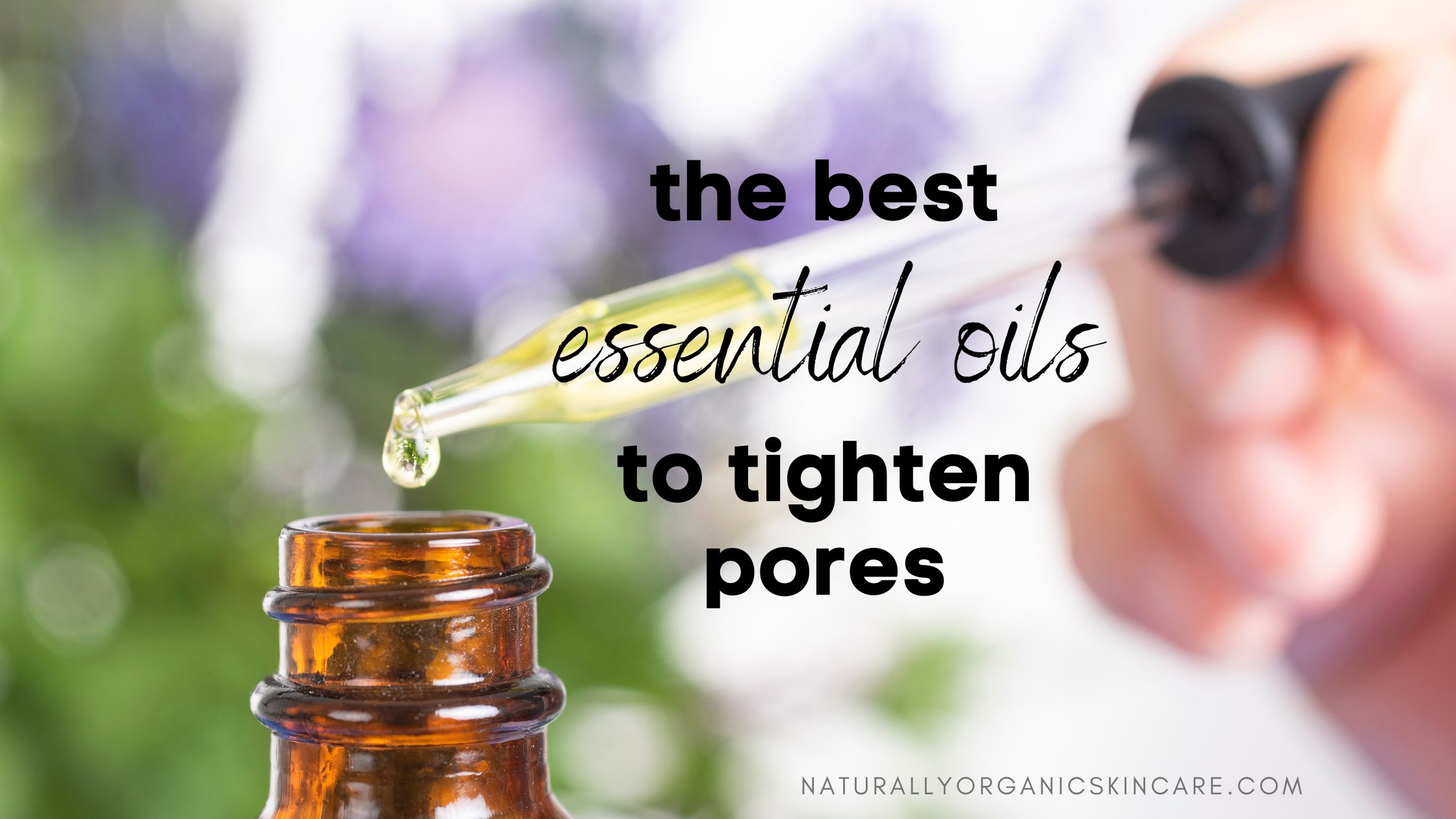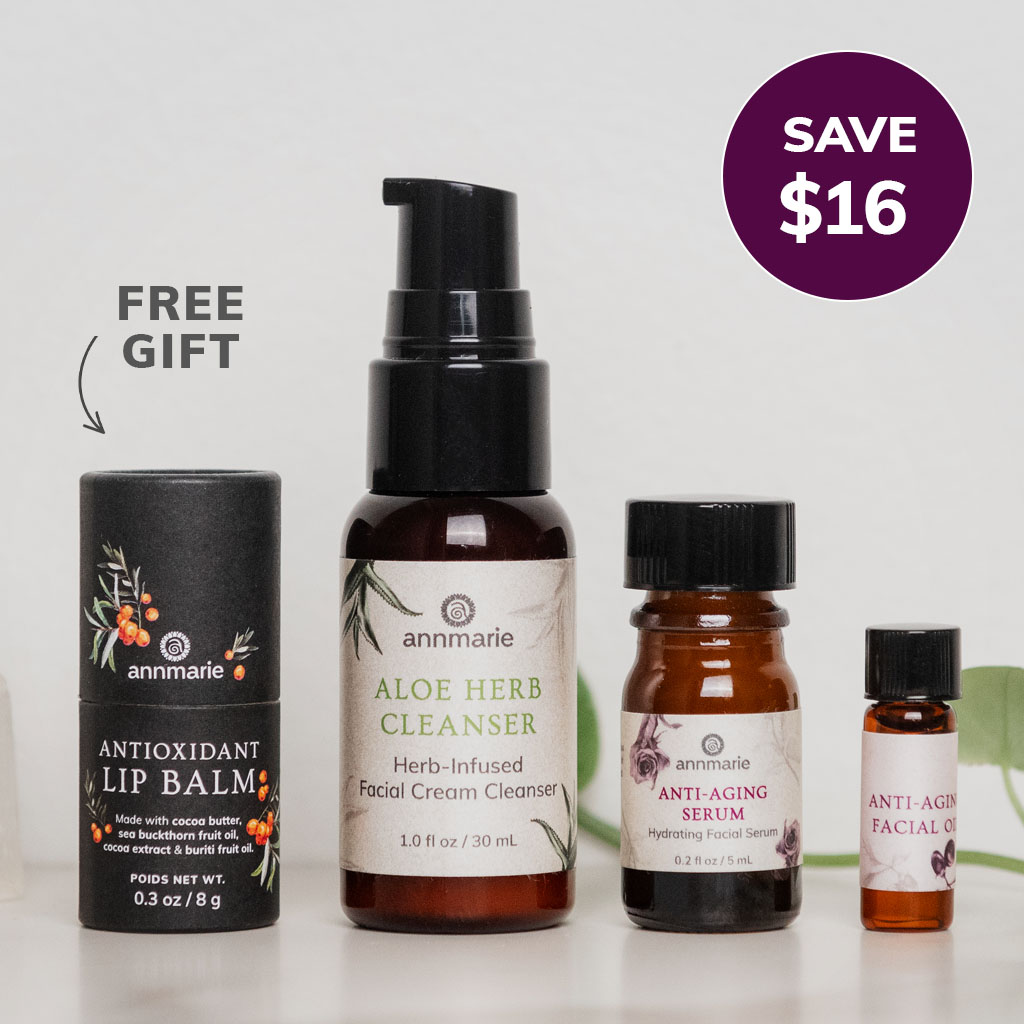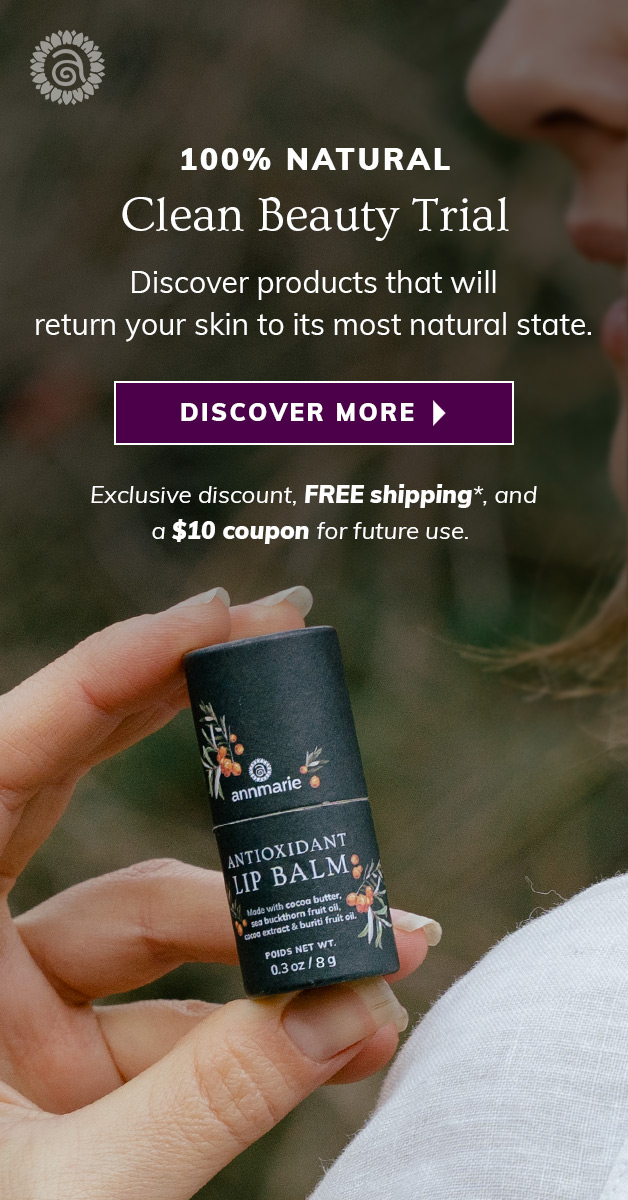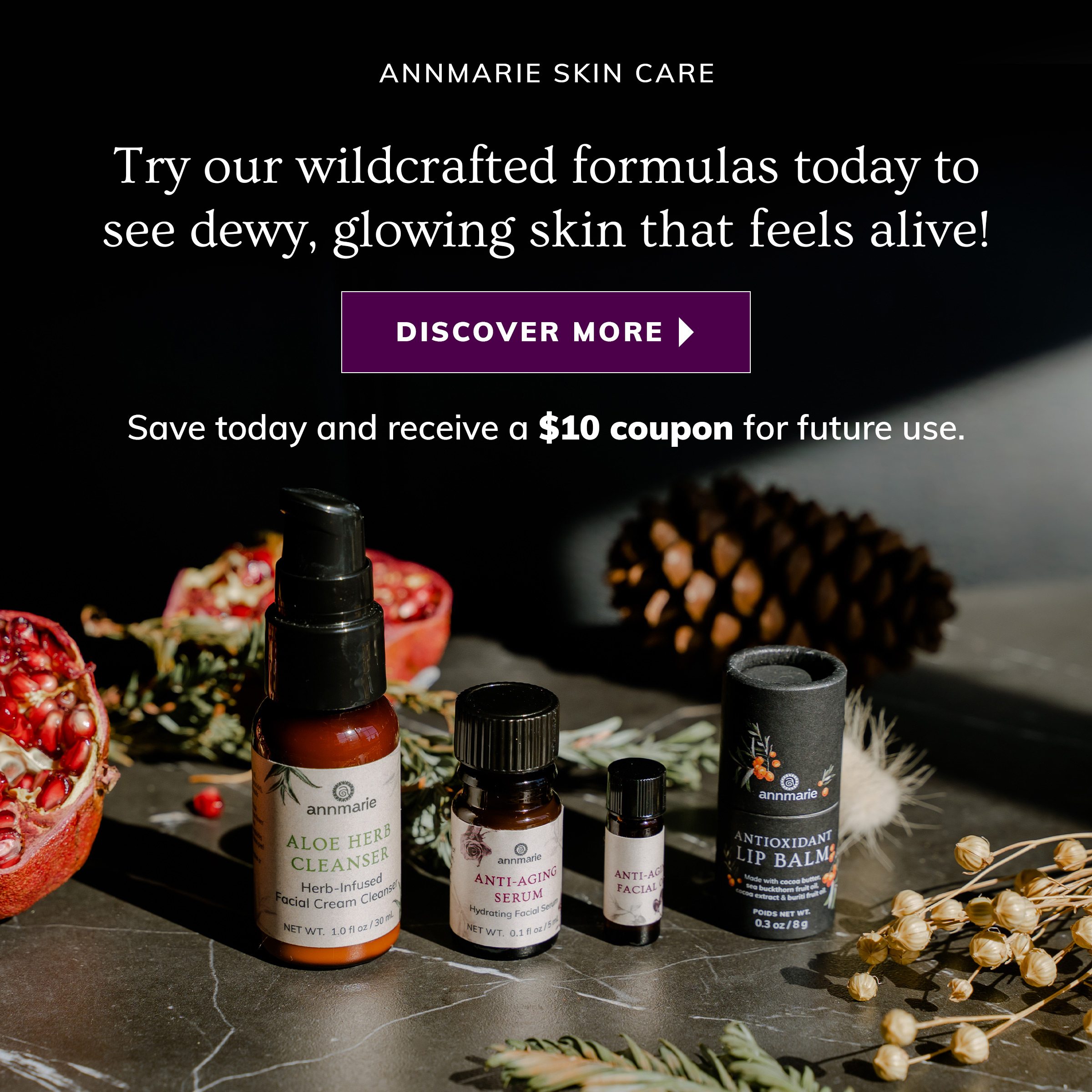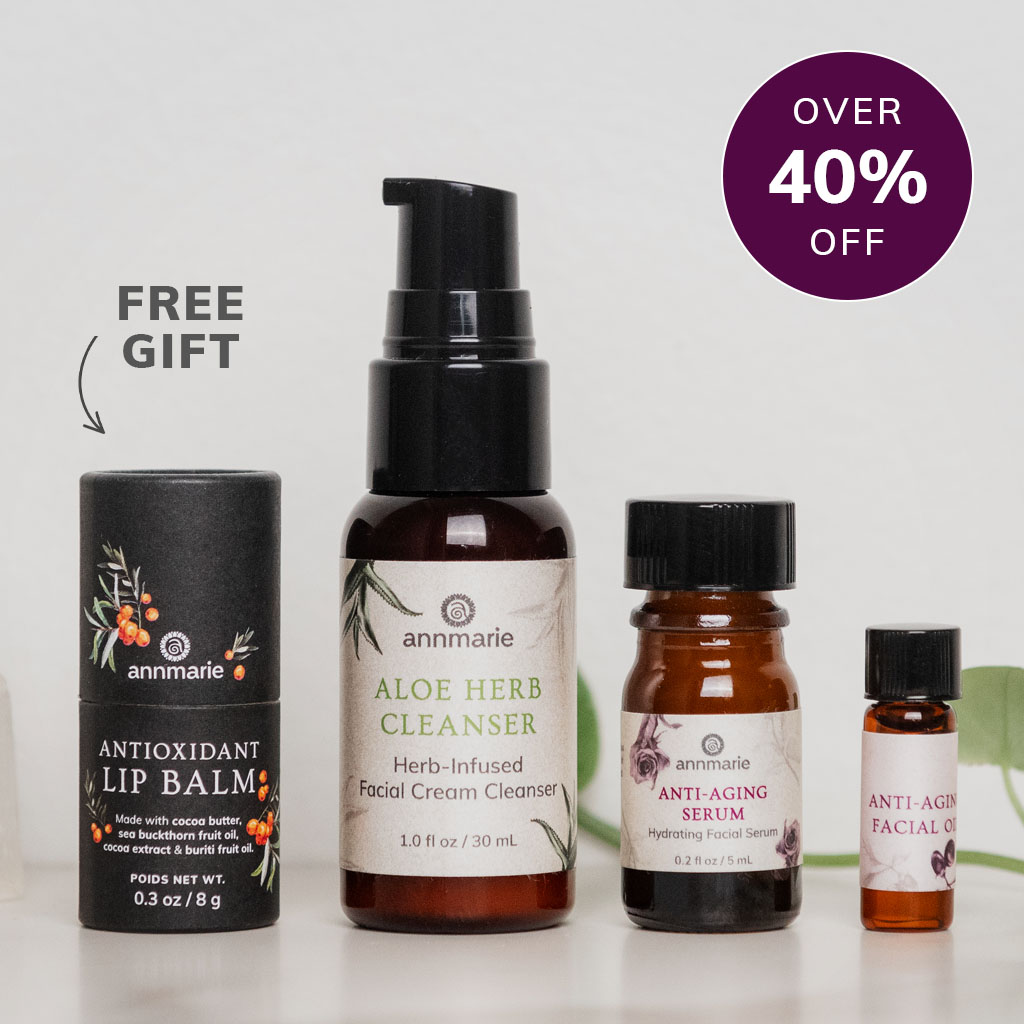If you’re already using natural skincare, your products might contain certain essential oils to tighten pores. As a newbie to the scene of green beauty, keep reading to learn more about these natural essences.
Table of Contents
- Using Essential Oils to Tighten Pores
- What Causes Enlarged Pores?
- Large Pores vs. Blackhead
- Choosing Oils by Skin Type
- Astringent Essential Oils
- Ways To Use Essential Oils In Skincare
- Best Carrier Oils For Enlarged Pores
- Additional Tips For Beautiful Skin
- Final Thoughts
Using Essential Oils to Tighten Pores
Our skin is the largest organ in our body, and it serves as a protective barrier against the environment. It also helps regulate our body temperature, and it’s responsible for producing vitamin D.
And those tiny openings on the surface of our skin? That’s right: pores! They allow the release of sweat and sebum. Pores are essential for healthy skin, but when they become enlarged, they can cause various skin problems such as blackheads, and even acne.
Pores contain tiny glands that produce sebum – the skin’s very own in-house moisturizer – if you wish. If those glands produce a bit more than you bargained for, your skin will tend to be oily.
Fortunately, essential oils can help to tighten pores and improve skin texture. In this article, we will discuss the benefits of essential oils for pore tightening and how to use them safely and effectively.
Now, whether you like to mix up your own oils, or buy ready-made natural skincare, the essential oils work either way.
Here’s a quick overview of some of the best essential oils that have pore-diminishing or astringent properties:
- Tea Tree Oil
- Lavender Oil
- Peppermint Oil
- Lemon Oil
- Geranium Oil
- Frankincense Oil
- Cypress Oil
- Juniper Berry Oil
- Clary Sage Oil
- Rosemary Oil
- Neroli Oil
- Orange Oil
These essential oils can be used in various ways to help tighten and minimize the appearance of pores. In the next sections, we’ll explore the benefits of each oil and how to use them safely and effectively for pore care.
For convenience, they link to Amazon, where you can compare prices for each oil. The inflated prices of MLM oils are so detrimental to actually enjoying their use! And you’re perfectly capable of buying essential oils on your own, like a grown-xxx person.
If you click through to Amazon and are overwhelmed by the variety, I’ recommend’ve been very happy with Revive Labs. They make pure, therapeutic grade essential oils without the inflated price-tag because they are deliberately not an MLM company.
What Causes Enlarged Pores?
- Genetics: Some people are more prone to enlarged pores due to their genetics.
- Age: As we age, our skin loses elasticity, and our pores can become more visible.
- Skincare routine: Using the wrong products or not properly cleansing the skin can lead to clogged pores and enlargement.
- Sun damage: Exposure to the sun’s harmful UV rays can damage the skin and lead to enlarged pores.
- Hormonal changes: Hormonal changes during puberty, pregnancy, and menopause can cause an increase in sebum production, leading to enlarged pores.
- Poor diet: Eating a diet high in processed foods, sugar, and unhealthy fats can contribute to skin problems and enlarged pores.
Essential oils can help address some of these factors by reducing inflammation, regulating sebum production, and promoting skin health. By incorporating essential oils into a skincare routine, you can help keep pores clean, healthy, and minimized in appearance.
Large Pores vs. Blackhead
Enlarged pores and blackheads are not exactly the same things, but they are related. Certain pores may be just that (large) without any blackheads present, while others form a blackhead, which in turn causes them to extend.
In case you’re wondering – a blackhead is simply sebum turned dark when exposed to oxygen.
Of course, the darker color of a blackhead tends to draw attention, regardless of pore size. The essential oils to tighten pores are the same ones as those used to target blackheads.
Essential Oils for Blackheads, the Natural Way to Smaller Pores mentions a lot of the same oils as those included here.
We’re talking about those with astringent properties. The fact that different oils are astringent in addition to their various other properties allows us to “shop around” and pick the oil(s) most suited to our overall skin type.
Choosing Oils by Skin Type
For younger skin with enlarged pores, veering on the oily side, Juniper, Rosemary, and Tea Tree could be a good fit. With strong antibacterial and anti-inflammatory properties, these oils can target enlarged pores all while helping to heal acne.
Frankincense is a great all-rounder, by the way, and can work well for oily, acne-prone, dry, and aging skin.
For mature skin, I’d probably go with Frankincense, Geranium, and Neroli. There are oils that combine astringent properties with anti-oxidant, skin tightening, and wrinkle-fighting properties.
If you can, why not combine those that improve blood circulation, skin elasticity, skin tone, or even collagen production all while reducing pore size?
That’s right – some essential oils even have collagen-boosting benefits! Good news if anti-aging is on your radar, right?! Check out chamomile, eucalyptus, frankincense, lemongrass, geranium, rose, and sandalwood.
As for essential oils that promote collagen growth, focus on carrot seed, lemon, frankincense, geranium, and neroli. These oils are great for healthy skin cell renewal. (And you’ll have recognized some of these oils on the list of essential oils to tighten pores, too. Beauty is a holistic affair.)
Astringent Essential Oils
Essential oils have all kinds of properties, such as antibacterial, antifungal, antioxidant, or expectorant – just to name a few. The term “astringent” is what’s used for those working that contribute to tightening pores.
So yes – astringent oils are what we’re after here. And more than a few essential oils have some degree of astringent properties, which means you even get to be picky about how they smell, all while enjoying that pore-shrinking effect!
Tea Tree Oil
Tea tree is a great essential oil to have in your first-aid kit. It has antimicrobial properties that can help reduce inflammation and, as part of a daily skincare regimen, prevent acne breakouts. Tea tree oil is a potent astringent that can help to tighten and minimize the appearance of pores.
Its antibacterial and anti-inflammatory properties make it an excellent choice for those with acne-prone or oily skin, as it can help to reduce excess oil and prevent breakouts. However, tea tree oil can be harsh on sensitive skin, so it should be used with caution and properly diluted.
Lavender Oil
Lavender essential oil is a gentle astringent that can help to tighten pores and improve the texture of the skin. Its soothing and calming properties make it a popular choice for those with sensitive or irritated skin. Additionally, lavender oil has antibacterial and anti-inflammatory properties that can help to reduce redness and inflammation.
Peppermint Oil
Has a cooling effect that can help soothe and refresh the skin while regulating sebum production. It is known to soothe inflammation, irritation, and itchiness on both the skin and scalp. It promotes wound healing, and it is also touted as a natural remedy for soothing bug bites. (Just in case you’re aiming to tighten those pores all while enduring a mosquito attack!) Peppermint essential oil has strong antimicrobial properties that can help combat acne, cleanse the skin, and unclog pores.
Lemon Oil
Lemon essential oil contains citric acid, which can help exfoliate the skin and promote cell turnover, leading to smoother, clearer skin. Lemon oil is a natural astringent that can help to tighten and firm the skin. Its high vitamin C content makes it an interesting choice for brightening and evening out the complexion. However, lemon oil can be phototoxic, meaning it can increase the skin’s sensitivity to the sun and cause sunburn, so it should be used with caution and not applied to the skin before going out in the sun.
Geranium Oil
Geranium essential oil is a gentle astringent that minimizes pores, while its anti-inflammatory properties are excellent for sensitive skin, reducing redness and inflammation. It balances the skin, making it an ideal choice for all skin types.
Frankincense Oil
Frankincense essential oil has anti-inflammatory properties that can help reduce redness and inflammation while promoting skin regeneration. It is a natural astringent that can help to tighten and firm the skin, with anti-inflammatory properties that can help to reduce redness and inflammation. Frankincense oil also works against aging with antioxidant properties to protect the skin from damage caused by free radicals. It is a truly amazing oil that stimulates the production of new skin cells and tissue, helping to repair damaged skin. From an aromatherapy standpoint, it’s an interesting oil because of its calming and grounding effect on the mind.
Cypress Oil
Cypress essential oil has vaso-constrictor and astringent properties to minimize pores, cleanse, and detoxify the skin. Its antiseptic and anti-inflammatory properties reduce excess oil and prevent breakouts. It’s also a great choice for aromatherapy due to its soothing and calming effect on the mind.
Juniper Berry Oil
Juniper essential oil has detoxifying properties that can help unclog pores and remove impurities from the skin. It can help to tighten and firm the skin, while antiseptic and anti-inflammatory properties make it a great choice for those with oily or acne-prone skin. Since it can help to reduce excess oil and prevent breakouts, juniper berry oil has a cleansing effect on the skin, and personally, I find the scent to be one of the most soothing and uplifting ones. Which doesn’t hurt.
Clary Sage Oil
Clary sage essential oil has antimicrobial properties that can help prevent acne breakouts while regulating sebum production. It is a gentle astringent that tightens pores and reduces inflammation. Its anti-inflammatory properties are perfect for sensitive skin, while its balancing effects make it ideal for all skin types.
Rosemary Oil
Rosemary essential oil is a popular ingredient in skincare due to its astringent and anti-inflammatory properties. It can reduce redness and irritation, help regulate sebum production, and reduce excess oil, making it a great choice for those with oily or acne-prone skin. Rosemary oil is also a source of antioxidants, which can protect the skin from damage caused by free radicals and environmental stressors.
Neroli Oil
Neroli Essential Oil has some antiseptic properties. It also acts as a natural astringent, helping to tighten the skin and reduce the appearance of large pores. Neroli oil is gentle on the skin and can help balance sebum production, making it suitable for both oily and dry skin types. Additionally, its uplifting aroma can help relieve stress and promote relaxation, which can have a positive impact on overall skin health.
Orange Oil
Orange essential oil is rich in vitamin C, which you’ve undoubtedly noticed is in more than a few natural skincare products. (For example, this range by Andalou Naturals, or this Mad Hippie Serum.) Vitamin C helps to brighten the skin and improve its texture. Orange oil has antioxidant properties that protect the skin from damage caused by free radicals, which can accelerate the aging process. Additionally, this oil has anti-inflammatory properties that can help to reduce redness and irritation, making it a great choice for sensitive skin. As a bonus, the scent is delicious!
As for the use of essential oils for smaller pores, orange oil can reduce the appearance and size of the pores, improving the texture of the skin. Its astringent properties help to tighten and firm the skin, reducing excess oil and giving the complexion a smoother, more youthful appearance.
These essential oils can be used in various ways, such as in facial steams, toners, or moisturizers, to help tighten and minimize the appearance of pores. Please also read on for the most important safety precautions, since it’s important to use oils safely and properly to avoid any adverse reactions.
Next, we’ll take a look at how exactly you can use these oils – there are so many ways to interact with essential oil, and you’ll likely find at least one or two favorites the more you experiment with these beauty rituals!
Ways To Use Essential Oils In Skincare
- Facial Steam: Add a few drops of essential oil to a bowl of hot water and lean over the bowl, covering your head with a towel. Breathe in the steam for 5-10 minutes to open pores and allow the essential oils to penetrate the skin.
- Toner: Add a few drops of essential oil to a witch hazel or apple cider vinegar toner and apply to the face with a cotton pad. This can help to remove impurities and tighten pores.
- Moisturizer: Mix a few drops of essential oil with a carrier oil such as jojoba, grapeseed, or rosehip oil and apply it to the face as a moisturizer. This can help to regulate sebum production and promote healthy skin.
- Face Mask: Add a few drops of essential oil to a clay or charcoal face mask and apply it to the face. Leave on for 10-15 minutes before rinsing off to help tighten pores and remove impurities.
- Facial Oil: Mix a few drops of essential oil with a carrier oil and apply to the face as a serum before moisturizing. This can help to nourish and protect the skin while reducing inflammation and promoting skin health.
It’s important to use essential oils safely and properly to avoid any adverse reactions. Essential oils should always be diluted with a carrier oil before applying to the skin, and a patch test should be done before using a new oil to check for any allergic reactions. Essential oils should also be avoided during pregnancy or if you have very sensitive skin.
Best Carrier Oils For Enlarged Pores
If you plan to mix one or more essential oils into a carrier oil, you may be wondering which carrier oils to choose. Here are some of my favorite natural oils that work well on normal, oily, or even acne-prone skin.
Avoid olive oil, which fatty acid profile is higher in oleic acid. While Olive oil will lock in moisture and hydrate your skin, it is also somewhat comedogenic, meaning it can easily harbor bacteria and clog your pores.
Coconut oil is also somewhat comedogenic and perhaps not the ideal one to reduce pore size.
Rosehip Oil
Rosehip oil has gotten hugely popular in the natural beauty industry. It can be used on mature skin, to combat fine lines and signs of aging. It’s also one of the better oils to try for oily, acne-prone, and combination skin. Rosehip oil is non-comedogenic so it should not contribute to the formation of blackheads. Quite the contrary.
Jojoba Oil
Jojoba oil is versatile. It’s one of the best oils out there, and good news for almost every skin type. Because its chemical profile is so similar to the lubricant produced by our skin’s own sebaceous glands, most skin types benefit from jojoba oil. On top of that, it has antibacterial properties. Jojoba oil is not the cheapest carrier oil, but for good reason! It’s a great way to start if you are unsure and new to using oils on your face. An allergic reaction to jojoba oil is virtually unheard of.
You can read more about some key differences between jojoba oil and other oils here:
When making your own essential oil blend in a carrier oil, the ratio of essential oil should be about 1%. Counting drops works great to ensure the homemade “facial serum” won’t come out too potent.
Just because these plant extracts are natural ingredients does not mean we can bathe in them – they’re also strong and powerful! Pure essential oils can be too strong for application directly to the skin, and the same goes for oils that aren’t diluted enough.
Tip: It sounds counter-intuitive to use oil to care for oily skin, right? When stripping away excess sebum and fighting oil production, it often results in the skin buckling down. On the other hand, the right oil for your skin type can reassure the skin that it doesn’t need to over-compensate and instead, restore balance. For best results, use oil sparingly and give your skin time to adjust.
Additional Tips For Beautiful Skin
- Exfoliation: Regular exfoliation can help remove dead skin cells and unclog pores, promoting healthy skin cell turnover. However, it’s important to choose a gentle exfoliant and avoid over-exfoliating, as this can cause skin irritation and inflammation.
- Avoid Pore-Clogging Products: Some skincare and makeup products can clog pores and exacerbate the appearance of enlarged pores. Look for non-comedogenic products.
- Sun Protection: Sun damage can lead to premature aging, including the appearance of enlarged pores. Protect your skin from harmful UV rays by wearing broad-spectrum sunscreen and avoiding prolonged sun exposure.
Incorporating essential oils into your skincare routine can be a natural and effective way to help tighten pores and promote healthy skin. By combining essential oils with regular exfoliation, pore-friendly products, and sun protection, a healthy, glowing complexion is closer than it may seem.
Final Thoughts
Don’t be afraid to experiment with different essential oils and find the ones that work best for your skin type and concerns. Patience and consistency are key – I know, I know, change can take a while.
As someone who is obsessed with the size of her pores, I understand how frustrating it can be to find effective skincare solutions. However, I’ve found that switching to all-natural skincare has made a big difference. My skin’s overall health has improved by using oils. Not just essential oils, but vegetable oils, too.
Whether you’re dealing with oily, combination, or dry skin, I encourage you to experiment with different essential oils and find the ones that work best for you. With some trial and error, you can achieve healthy, radiant skin that you’re proud to show off.
Oh, and one more thing: It’s a shame that essential oils have become linked with MLM marketing schemes and the rather annoying “friends” who can’t seem to talk about anything else. Don’t let that deter you from giving them a chance. Essential oils are amazing – they existed long before DoTerra or Young Living. Let’s hope the use of oils will outlive those constructs, too, ha! Cheers to that.
